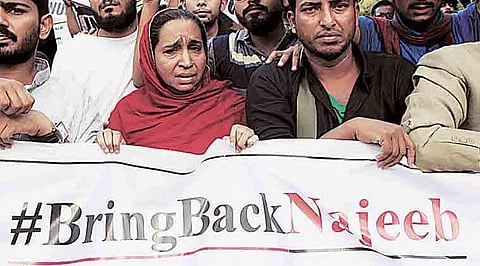

On October 19, 2016, Sunil Kumar started working on his second film. After the success of his first film, Rice Bowl to Ashtray — a documentary on industrialisation and displacement in Chhattisgarh, he was keen on working on another social issue that would impact a large number of people. And the topic was right there in front of him — the uprising in Indian campuses. A filmmaker based out of Delhi, he went around covering incidents in a few colleges and universities near him. Needless to say, JNU was one of them.
That was when a peculiar incident, that happened exactly four days before he started working on his film, caught his eye — the disappearance of Najeeb Ahmed, a first year MSc Biotechnology student. And Sunil knew that he had to follow up on this issue. "I'd come across lynchings, but this sort of an incident was really new to me. So I thought I must follow this," says Sunil. Slowly, the focus of the documentary shifted to Najeeb and then to his mother Fatima Nafees, whom he fondly called Ammi.
Two years and two months down the line, on Wednesday, Sunil's documentary Ammi premiered in front of the students of Aligarh Muslim University. A day later, we caught up with the filmmaker who, coincidentally, became a part of the protest, through his camera and frames. "I didn't know Najeeb or Ammi before I started working on the film. But I wanted to be a part of her struggle to seek justice and find her son," he says.
Najeeb's disappearance was one of the major incidents that shook JNU in 2016. While the case still remains a mystery, the faculty and students of JNU, and various political parties across the country, have staged multiple protests seeking a proper investigation. The case was initially investigated by the Vasant Kunj Police, followed by a Special Investigation Team of the Delhi Police, then by the Crime Branch and finally by the Central Bureau of Investigation — all of whom failed to make any progress.
But in that span of two years, Ammi went through a tremendous transformation. "I met Ammi only after Najeeb's disappearance," Sunil says, "It was difficult to talk to her initially. She was in a state of trauma and I didn't want to trouble her more by making her repeat things."
A month later, Sunil interviewed Ammi for the first time. "The interview wasn't that great. She was very emotional. So, I waited," he says. He even reached a point where he lost all hope of narrating the tale from her perspective and getting her to speak to him. But Sunil was adamant and went on shooting all the protests and processions. "Finally, I got a proper interview of hers only five months ago. But by then, she knew that being emotional wouldn't help her," he says, adding, "She had to fight for justice and for that, she had to make herself stronger. That, in a way, worked in my film's favour," he says, unabashed by his honesty.
That change intrigued this filmmaker and that was how a Muslim woman, from a lower-middle-class household in Uttar Pradesh who stood against the whole regime, became the protagonist of the documentary. "Ammi is a simple woman who never preferred to step out of her house. She learnt the basics of the English alphabet with her children. A homemaker, she always stayed indoors. I wanted to tell the tale of how she became the face of this protest," he says.
At first, Sunil hadn't thought of a name for the film. It was decided only at the end and in every way, it was a perfect fit. "Najeeb's Ammi is everyone's Ammi today. She is also a symbol of hundreds of women in this country who are seeking justice for their sons, brothers and husbands," he says. He also wanted to include Rohith Vemula's mother Radhika Vemula as a part of the film, but that somehow didn't work out.
Sunil, like many others, still doesn't know what happened to Najeeb. He believes that the police must answer that question. But what he was keen on finding out was why the JNU administration and the investigators did not bother finding out more about him getting assaulted by a few ABVP activists. "The officials denied all the facts about the assault. They wanted everyone to believe that Najeeb left JNU of his own volition. I don't know what has happened to him, but the Delhi Police and the JNU administration were trying to save someone," he says.
He adds that while the JNU students were really cooperative with him while he shot the film, the administration wasn't very welcoming. "It was really tough to shoot at the hostel where Najeeb lived. I had to get a few shots covertly. This wouldn't have been possible without the help of the students," says Sunil, who is now planning to screen the documentary in all the campuses in India.
